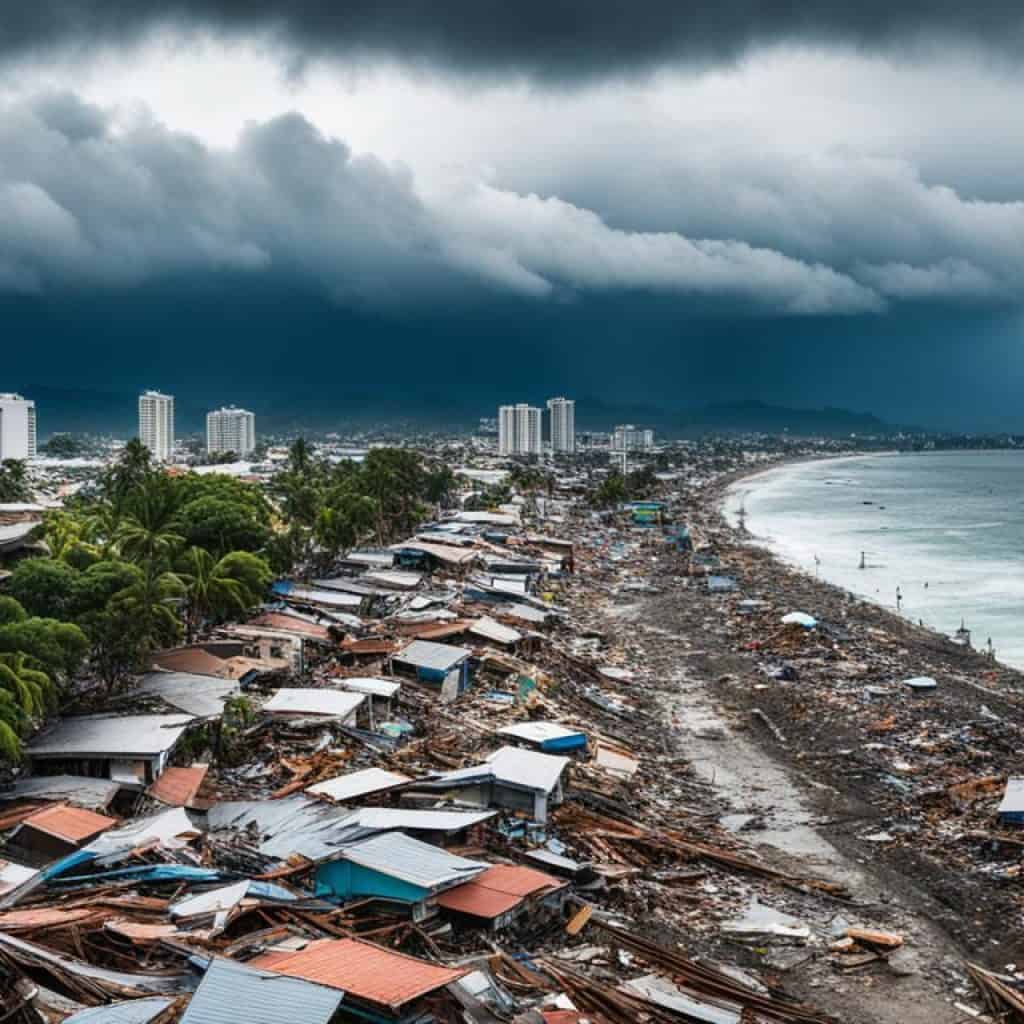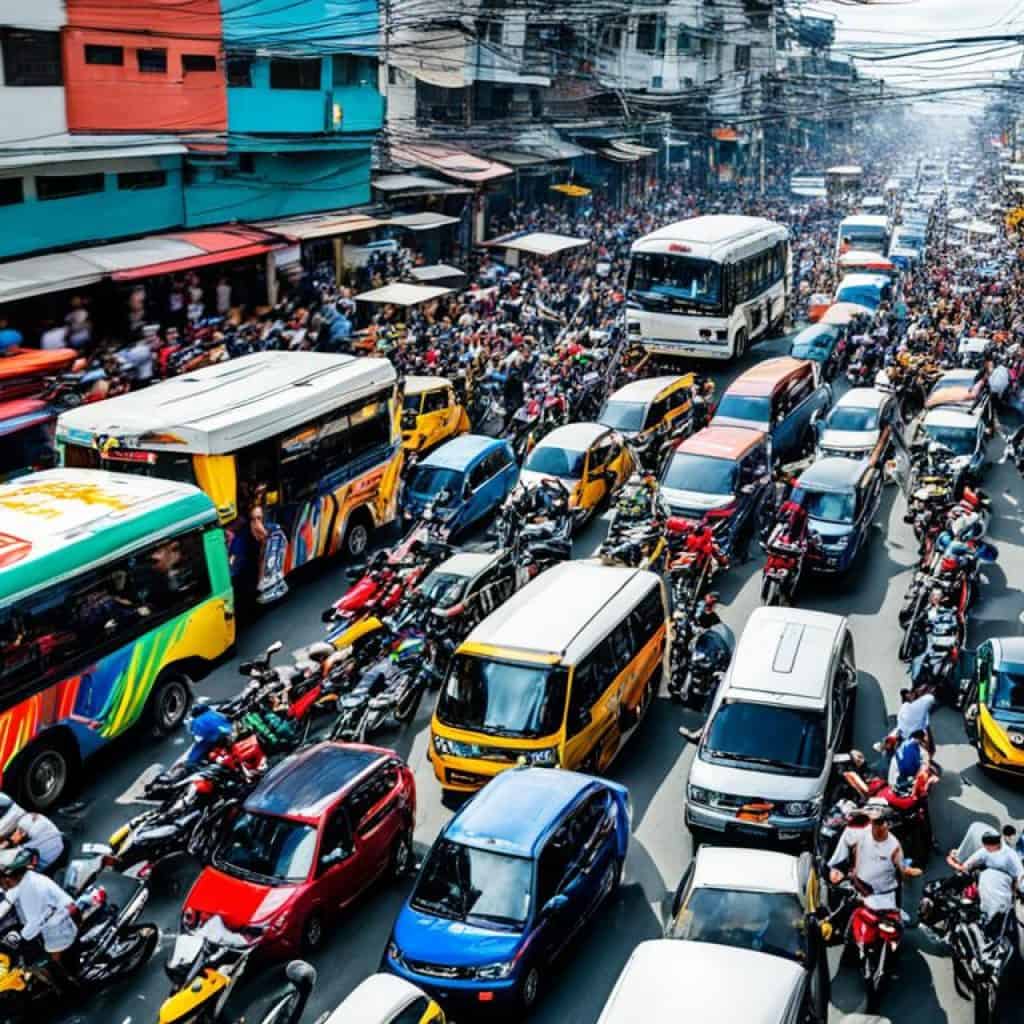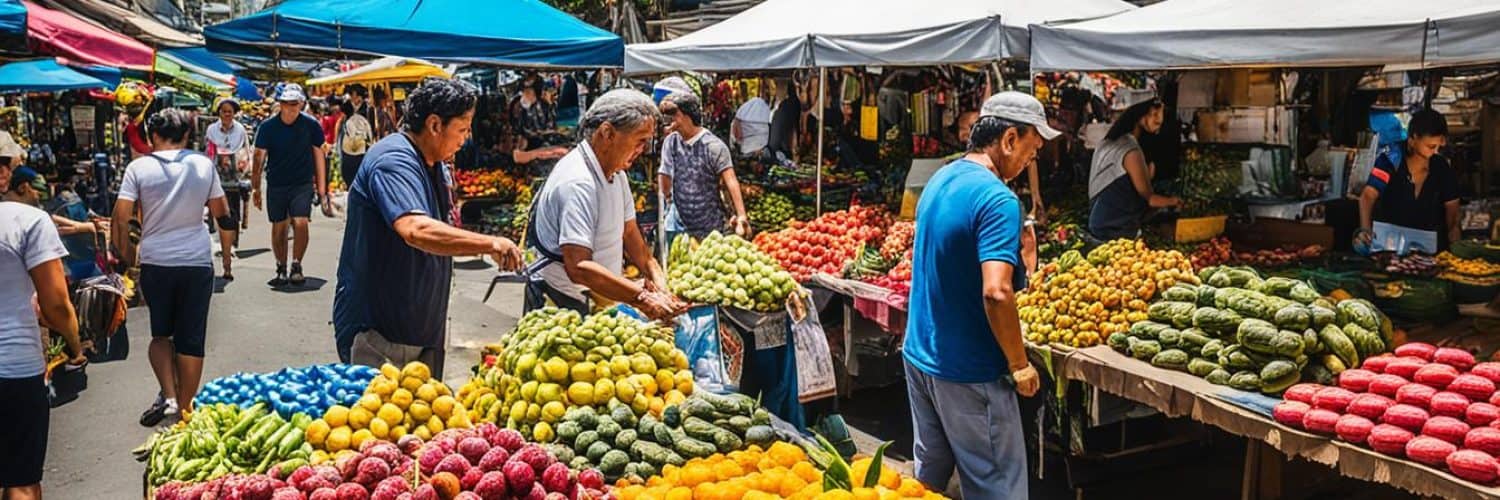Are you considering a move to the Philippines? What if I told you that this tropical paradise has a few hidden surprises? While the Philippines is known for its beautiful natural landscapes, warm culture, and affordable cost of living, there are aspects of expat life that may raise some questions.
In this article, we will explore the pros and cons of living in the Philippines to help you make an informed decision. From the cost of living to the healthcare system, education, and even the culinary delights, you’ll discover a wealth of information that goes beyond the postcard-perfect images.
Key Takeaways:
- The Philippines offers a beautiful natural landscape and warm culture.
- The cost of living is generally affordable with a diverse cuisine to explore.
- Safety concerns and natural disasters are important considerations.
- Public healthcare and education options vary in quality.
- The transportation system provides accessibility, but driving can be chaotic.
Lifestyle in the Philippines
The Philippines is famous for its beautiful natural scenery, making it an ideal destination for those who appreciate outdoor entertainment and vibrant culture. With over 7,000 islands and stunning beaches, the country offers a picturesque landscape that is sure to captivate expats and tourists alike.
Whether you enjoy swimming, hiking, or surfing, the Philippines has an array of outdoor activities to suit every preference. The crystal-clear waters invite you to take a refreshing dip, while the lush mountains provide endless opportunities for trekking and exploration.
One of the highlights of living in the Philippines is the vibrant cuisine. Filipino food blends Southeast Asian flavors with Spanish influences, creating a unique culinary experience. From adobo, a flavorful meat stew, to lechon, a roasted pig dish, there is no shortage of delicious dishes to satisfy your taste buds.
“The Philippines offers a stunning natural landscape with over 7,000 islands and beautiful beaches. Expats can enjoy outdoor activities such as swimming, hiking, and surfing. The country also boasts a vibrant cuisine that combines Southeast Asian and Spanish influences.” – Expat living in the Philippines
As a visual representation of the beautiful natural scenery in the Philippines, take a moment to admire this breathtaking image:
Outdoor Activities
When it comes to outdoor entertainment, the Philippines has it all. Whether you prefer lounging on pristine beaches, snorkeling in colorful coral reefs, or challenging yourself with exhilarating hikes, you will never run out of things to do.
- Beach Hopping: Explore the world-famous beaches of Boracay, El Nido, and Siargao.
- Surfing: Ride the waves in popular surf spots like Baler, La Union, and Zambales.
- Trekking: Conquer the challenging trails of Mount Apo, Mount Pulag, or Mount Mayon.
- Diving: Discover the rich marine life in popular dive sites such as Tubbataha Reefs Natural Park and Apo Island.
Philippine Cuisine
Indulge your taste buds in the flavorful and diverse cuisine of the Philippines. From street food to fine dining, the country offers a wide range of dishes that are sure to satisfy any palate:
- Adobo: A mouth-watering dish made with meat (usually pork or chicken) marinated in vinegar, soy sauce, garlic, and spices.
- Sinigang: A sour soup made with tamarind, tomatoes, and various vegetables, often infused with meat or fish.
- Kare-kare: A hearty stew made with oxtail and peanut sauce, typically served with vegetables and bagoong (shrimp paste) on the side.
- Lechon: A whole roasted pig, crispy on the outside and tender on the inside, often served as the centerpiece of festive occasions.
Experience the vibrant culture, exquisite cuisine, and beautiful natural scenery of the Philippines. It’s a lifestyle that promises adventure, flavor, and endless opportunities for exploration.
Safety in the Philippines
While the Philippines is undoubtedly a beautiful country with a rich cultural heritage and stunning natural landscapes, it’s important to be aware of the safety concerns that exist. High crime rates and the risk of natural disasters can impact the overall sense of security for residents and visitors alike.
“Safety and security don’t just happen, they are the result of collective consensus and public investment. We owe our children, the most vulnerable citizens in our society, a life free of violence and fear.” – Nelson Mandela
Additionally, the Philippines is prone to natural disasters, such as typhoons and earthquakes. These events can occur with little warning and have the potential to cause significant damage. Being prepared and having an emergency plan in place is crucial.
To mitigate the risks associated with high crime rates and natural disasters, it’s advisable to stay informed about local safety guidelines and heed the advice of authorities. Being cautious, maintaining situational awareness, and taking necessary precautions can help ensure a safer experience while living or traveling in the Philippines.

Crime Prevention Tips
- Avoid displaying signs of wealth or valuable belongings in public.
- Be cautious when using public transportation and keep an eye on your belongings.
- Stick to well-lit and populated areas, especially at night.
- Keep photocopies of important documents and store them separately from the originals.
- Maintain a list of emergency numbers and contacts.
Preparing for Natural Disasters
- Stay informed about local weather advisories and any potential threats.
- Create an emergency kit with essential supplies, including food, water, medications, and important documents.
- Identify safe areas in your surroundings and establish evacuation plans.
- Keep emergency contact numbers readily accessible.
- Follow guidance from local authorities and evacuation orders.
Cost of living in the Philippines
One of the major advantages of living in the Philippines is the low cost of living. Expats can enjoy a comfortable lifestyle without breaking the bank. Let’s take a closer look at some key aspects of the cost of living in the country:
Inexpensive Groceries
Groceries in the Philippines are generally affordable, making it easier to manage your food budget. Whether you prefer to cook at home or dine out, you’ll find a wide range of fresh produce, meats, and local ingredients at reasonable prices.
Free Public Healthcare
Access to healthcare is an essential consideration for any expat. In the Philippines, public healthcare is available to expats free of charge. This means you can receive medical care without worrying about hefty expenses, providing peace of mind for you and your family.
Reasonable Accommodation Prices
When it comes to finding a place to live, accommodation prices in the Philippines are generally reasonable. Whether you’re looking for an apartment in the city or a house in a suburban area, there are options available to suit various budgets. It’s important to note that prices may vary depending on the location and amenities.
Expensive Electricity
While many aspects of the cost of living in the Philippines are affordable, electricity bills can be a bit pricey, especially during the hot summer months when air conditioning is a necessity. It’s important to factor in electricity costs when planning your monthly budget to avoid any surprises.
Overall, the Philippines offers a relatively low cost of living, with inexpensive groceries, free public healthcare, and reasonable accommodation prices. However, it’s important to be mindful of electricity expenses, particularly during the summer season.
Accommodation in the Philippines
When it comes to finding a place to call home in the Philippines, you’ll be spoilt for choice. The country offers an abundance of housing options, ranging from apartments in bustling cities to spacious houses in serene gated communities.
Investing in Gated Communities

Many expats in the Philippines opt to live in gated communities for added security and peace of mind. These communities often provide amenities such as swimming pools, fitness centers, and 24/7 security personnel.
Gated communities offer a sense of exclusivity and a close-knit community feel. Expats can enjoy a safe environment while still being part of a vibrant neighborhood.
Home Security Concerns
While the Philippines provides a wide range of accommodation options, it’s essential to address the issue of home security. The country experiences high crime rates in certain areas, making it crucial for expats to take appropriate precautions.
Ensuring the security of your home should be a top priority. Invest in reliable security systems, such as alarm systems, CCTVs, and secure locks. Building rapport with your neighbors and staying informed about the local security situation can also contribute to a safer living environment.
| Housing Options in the Philippines | Features |
|---|---|
| Apartments | Convenient for urban living, often come with amenities like pools or gyms. |
| Houses | Spacious properties, suitable for families or individuals who prefer a private space. |
| Gated Communities | Enhanced security, community amenities, and a sense of exclusivity. |
| Condominiums | Combines the perks of an apartment and a house, with shared facilities and a more affordable price tag. |
While you enjoy the variety of housing options, prioritize your home security to ensure a safe and comfortable living experience in the Philippines.
Education and schools in the Philippines
The Filipino education system draws influences from both American and Spanish traditions, providing a unique learning experience for students. One of the key advantages is the availability of public schools, which offer free education in either English or Filipino, allowing students from different backgrounds to thrive.
For expat children, there are also numerous international schools in the Philippines. These schools follow different curricula, such as the International Baccalaureate or the American curriculum, providing a diverse and globally recognized education.
However, when considering education options in the Philippines, it’s important to be aware of the quality of public education. Limited facilities and large class sizes can present challenges for students and impact the overall learning experience.
Despite the challenges, there are many dedicated teachers and educators in the public school system who strive to provide the best education possible, ensuring students receive a strong foundation for their future endeavors.
Comparison of Public Schools and International Schools in the Philippines
| Aspects | Public Schools | International Schools |
|---|---|---|
| Curriculum | Follow the national curriculum in English or Filipino | Diverse curricula, such as International Baccalaureate or American curriculum |
| Quality of Facilities | Limited facilities | Modern facilities and resources |
| Class Sizes | Large class sizes | Smaller class sizes |
| Teaching Staff | Dedicated teachers with varied qualifications | Foreign-trained teachers with expertise in their respective fields |
Choosing the right educational institution for your child requires careful consideration. Public schools in the Philippines provide an opportunity to immerse in the local culture and language, while international schools offer a more diverse and global environment.
Transport and driving in the Philippines
The Philippines boasts an extensive and convenient public transport system, making it easy for both locals and expats to get around. Buses, trains, and jeepneys are widely available, offering a cost-effective way to travel within and between cities. This extensive public transport network ensures that you can reach your destination efficiently and affordably.
However, it is important to note that driving in the Philippines can be quite chaotic. Traffic rules are often disregarded, and the flow of vehicles can be unpredictable. While some expats may choose to drive themselves, it is recommended to exercise caution due to the challenging driving conditions and lack of adherence to road regulations.
For those who prefer to avoid the chaotic driving experience, relying on public transport can be a safer and more stress-free option. Alternatively, many expats opt to hire drivers who are familiar with the local roads and traffic patterns. This allows them to navigate the streets without the added stress of driving themselves.
Overall, the extensive public transport system in the Philippines provides a reliable means of transportation for expats. Whether you choose to drive or utilize public transport, it is essential to remain cautious and adapt to the local driving culture to ensure a smooth and safe journey.

“Driving in the Philippines can be quite challenging, especially for expats who are not accustomed to the chaotic traffic. It is advisable to use public transport or hire a driver to ensure a stress-free commute.”
Pros of Living in the Philippines
Living in the Philippines offers a multitude of advantages that make it an attractive destination for expats. From an affordable cost of living to friendly locals, the country provides a welcoming environment for those seeking a new place to call home.
Affordable Cost of Living
The Philippines boasts a remarkably low cost of living compared to many other countries. From groceries to dining out, expats can enjoy affordable prices without compromising on quality. This affordability allows individuals and families to stretch their budgets and enjoy a comfortable lifestyle.
Friendly Locals
The people of the Philippines are known for their warm hospitality and welcoming nature. Embracing a culture of respect and friendliness, locals are always ready to lend a helping hand and make expats feel at home. Their genuine warmth creates a sense of belonging and fosters positive relationships within the community.
Year-Round Warm Weather
The Philippines is blessed with a tropical climate, offering year-round warm weather. This means that even during the winter months, you can enjoy pleasant temperatures and sunny skies. The consistent warmth allows for an outdoor lifestyle and access to beautiful natural scenery.
Beautiful Beaches
With over 7,000 islands, the Philippines is a paradise for beach lovers. Stunning white sand beaches, crystal-clear waters, and breathtaking sunsets await expats who choose to call this country home. Whether relaxing on the shores or engaging in water sports, the beaches of the Philippines provide endless opportunities for leisure and enjoyment.
Diverse Cuisine
The Philippines is renowned for its vibrant and diverse cuisine. From traditional dishes steeped in local flavors to international gastronomic delights, expats can indulge in a culinary adventure. Exploring street food stalls, seafood markets, and fine dining restaurants will satisfy even the most discerning palates.
English Widely Spoken
Established Expat Community
The Philippines has an established expat community, offering support and camaraderie to those who choose to make it their home. Expats can connect with like-minded individuals, engage in social activities, and benefit from shared experiences. This sense of community creates a support system and provides a valuable network for newcomers.
Breathtaking Nature and Wildlife
The Philippines is known for its breathtaking natural landscapes and diverse wildlife. From lush rainforests to stunning waterfalls, the country’s natural beauty never fails to captivate. Additionally, the Philippines is home to unique species of flora and fauna, offering nature enthusiasts unparalleled opportunities for exploration and discovery.
Accessible Public Transport
The Philippines has an accessible public transport system that facilitates convenient travel within and between cities. Buses, trains, and jeepneys provide affordable options for commuting and exploring different parts of the country. This accessibility makes it easier for expats to navigate their surroundings and enjoy all that the Philippines has to offer.
Whether you are seeking an affordable cost of living, a warm and friendly community, or the allure of stunning beaches and nature, the pros of living in the Philippines are undeniable. This vibrant country has so much to offer and fully embraces expats who choose to make it their home.
Cons of Living in the Philippines
While the Philippines offers many advantages, there are some challenges and disadvantages associated with living in the country. It’s important to consider these factors before making the decision to move. Here are some of the cons of living in the Philippines:
Inability to Own Property
As an expatriate, you are generally not allowed to own land or property in the Philippines, except in certain circumstances. This can limit your investment opportunities and long-term financial security.
Crowded Cities
The major cities in the Philippines, such as Manila, can be highly congested and crowded. Traffic jams and long commutes are common, leading to increased stress levels and reduced quality of life.
High Poverty Levels
The Philippines has a high poverty rate, with a significant portion of the population living below the poverty line. This can result in unequal access to resources and services and contribute to social inequalities.
High Crime Rates
The country has relatively high crime rates, particularly in urban areas. Expats may be targeted by pickpockets, scammers, or even face more serious crimes. Safety precautions and awareness are essential.
Terrorism Threats
Risk of Natural Disasters
The Philippines is prone to natural disasters such as typhoons, earthquakes, and volcanic eruptions. These events can cause significant damage to property, infrastructure, and pose risks to personal safety.
Air Pollution
Many cities in the Philippines experience high levels of air pollution, particularly due to traffic congestion and industrial activities. This can have negative effects on respiratory health and overall well-being.
While these are some of the cons of living in the Philippines, it is essential to weigh them against the country’s unique advantages and personal circumstances. Making an informed decision based on your priorities and lifestyle preferences is crucial.
Conclusion
Living in the Philippines offers a unique experience with its stunning natural beauty, warm culture, and lower cost of living. However, it’s essential to consider the pros and cons before making the decision to move.
The pros include the breathtaking scenery, year-round warm weather, and affordable cost of living. The country’s diverse cuisine, friendly locals, and the widespread use of English also make it an attractive destination. Moreover, an established expat community and accessible public transport add convenience to everyday life.
On the other hand, there are some challenges to consider. Safety concerns, particularly in crowded cities like Manila, should not be taken lightly. High poverty levels, crime rates, and the risk of natural disasters pose additional obstacles. Furthermore, the inability to own property as an expat and air pollution are factors that may affect quality of life.
When considering living in the Philippines, it is crucial to weigh the advantages and disadvantages against personal preferences and circumstances. Understanding the local culture, being aware of safety precautions, and planning for potential challenges can help expats make a well-informed decision. Ultimately, the Philippines can be a rewarding destination, but it requires careful consideration of the pros and cons before taking the leap.
FAQ
What are the pros and cons of living in the Philippines?
The Philippines offers a beautiful natural landscape, vibrant culture, and lower cost of living. However, safety concerns, crowded cities, and other challenges must be considered.
What is the lifestyle like in the Philippines?
Expats in the Philippines can enjoy beautiful natural scenery, engage in outdoor activities such as swimming and hiking, indulge in delicious Philippine cuisine, and experience the warm and vibrant local culture.
How safe is it to live in the Philippines?
The Philippines has high crime rates, especially in Manila, and is prone to natural disasters such as typhoons and earthquakes. Safety should be a concern for expats and tourists.
What is the cost of living like in the Philippines?
The cost of living in the Philippines is generally low. Groceries and eating out are affordable, public healthcare is free for expats, but electricity can be expensive, especially during the hot summer months.
What are the accommodation options in the Philippines?
There are plenty of housing options available in the Philippines, including apartments and houses in gated communities. However, home security can be a concern due to the high crime rates in certain areas.
How is the education system in the Philippines?
The Filipino education system is influenced by both American and Spanish systems. Public schools offer education in English or Filipino, and there are also many international schools available. However, the quality of public education can be a concern due to limited facilities and large class sizes.
What is the transportation system like in the Philippines?
The Philippines has an extensive public transport system, including buses, trains, and jeepneys. However, driving can be chaotic and risky due to the lack of adherence to traffic rules. Many expats opt for using public transport or hiring drivers.
What are the pros of living in the Philippines?
The pros of living in the Philippines include an affordable cost of living, friendly locals, year-round warm weather, beautiful beaches, a diverse cuisine, the widespread use of English, an established expat community, breathtaking nature and wildlife, and accessible public transport.
What are the cons of living in the Philippines?
The cons of living in the Philippines include the inability to own property as an expat, crowded cities, high poverty levels, high crime rates, terrorism threats, the risk of natural disasters, and air pollution.


















Add comment